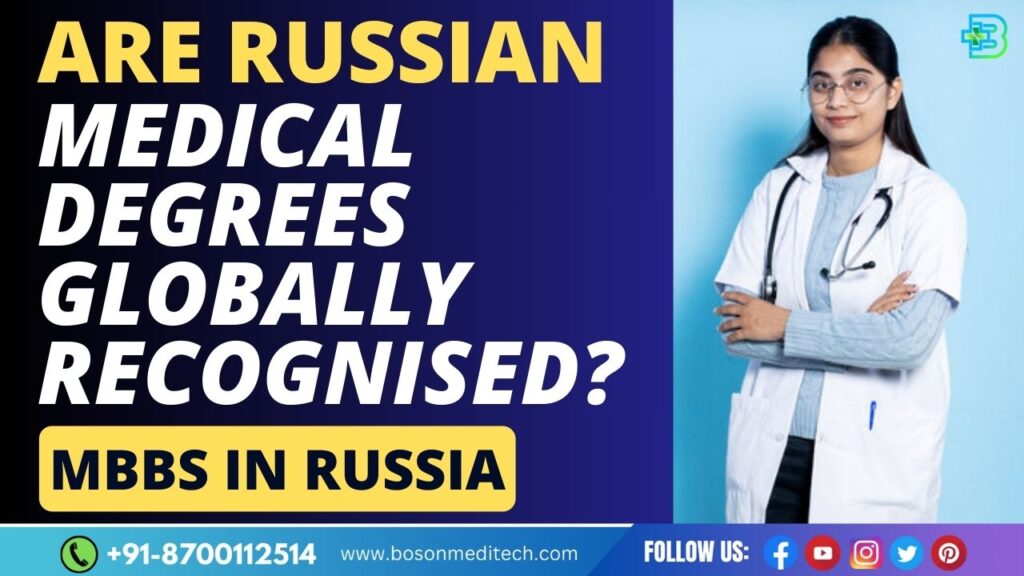
Are Russian Medical degrees Valid and globally recognised?
Russian medical degrees are generally recognized and accepted in many countries around the world. Russian medical universities are known for providing quality education and producing competent medical professionals. The recognition of Russian medicine degrees varies depending on the specific country and its medical regulatory bodies. Yes, Russian MBBS degrees are generally valid and globally recognized in many countries. Russian medical universities are known for providing quality education, and their degrees are accepted by various international medical bodies and organizations. However, the recognition of tehse degrees can vary depending on the specific country and its medical regulatory authorities.
Many countries recognize and accept Russian medical degrees, including the United States, the United Kingdom, Canada, Australia, and several European countries. However, individuals with such degrees often need to fulfill certain requirements and undergo additional processes to practice medicine in these countries.
For example:
In the United States, graduates of Russian medical programs are typically required to pass the United States Medical Licensing Examination (USMLE) to be eligible for residency programs and medical practice.
In the United Kingdom, graduates may need to pass the Professional and Linguistic Assessments Board (PLAB) exams and meet the General Medical Council’s (GMC) requirements for licensure.
It’s important for individuals with Russian medical degrees to research and understand the specific requirements and procedures set by the country where they intend to practice.
Therefore, many countries, including the United States, the United Kingdom, Canada, Australia, and several European countries, recognize Russian medicine degrees. However, it is important to note that recognition may involve certain requirements and processes that individuals need to fulfill. These requirements often include successfully passing licensing examinations, language proficiency tests, and fulfilling specific criteria set by the respective country’s medical regulatory authorities.
It is crucial for individuals with Russian MBBS degrees to research and understand the specific requirements and procedures set by the country where they intend to practice. Consulting with the respective medical regulatory authorities or seeking guidance from educational advisors can provide accurate and up-to-date information regarding the recognition of Russian MBBS degrees in different countries.
Scope after MBBS in Russia
After completing MBBS in Russia, Indian students have several opportunities and pathways to consider. Here are some potential career options and scopes for Indian students who graduate from Russian medical universities:
FMGE Exam and Medical Registration in India: Indian students who complete their MBBS in Russia must qualify for the Foreign Medical Graduates Examination (FMGE) conducted by the National Board of Examinations (NBE) in India. Successful clearance of FMGE allows them to register with the Medical Council of India (MCI) or the National Medical Commission (NMC) and practice medicine in India.
Clinical Practice in India: Graduates can pursue a medical career in India by working in hospitals, clinics, or setting up their own medical practice. There is a demand for qualified doctors in various specialties, and Indian medical graduates are sought after in both government and private healthcare sectors.
Postgraduate Studies (MD/MS) in India: After completing MBBS, students can pursue postgraduate studies in India to specialize in a particular field. This involves obtaining a Master of Medicine (MD) or Master of Surgery (MS) degree, leading to advanced expertise in a specific medical discipline.
Research and Academia: Some graduates may choose a career in research and academia. They can engage in medical research, contribute to scientific advancements, and pursue teaching positions in medical colleges or universities.
International Medical Opportunities: Graduates may explore opportunities to work or pursue further studies in other countries. Many countries recognize Russian medical degrees, and graduates can apply for licensure or postgraduate programs abroad.
Clinical Practice in Russia: Some graduates may choose to practice medicine in Russia, either by securing employment in Russian hospitals or establishing their medical practice. Proficiency in the Russian language may be advantageous for this option.
Preparation for Specialized Exams: Students can prepare for and appear in specialized exams in their chosen medical specialty, both in India and internationally. This may include exams for postgraduate studies or specialization in a specific medical field.
Public Health and Administration: Graduates can explore opportunities in public health, healthcare administration, or health policy. This involves roles in healthcare management, policy development, and public health initiatives.
It’s essential for graduates to stay informed about the requirements for medical practice in their desired location and specialty. Additionally, pursuing continuous education, staying updated on medical advancements, and considering personal career goals are important aspects of planning the next steps after completing MBBS in Russia.
